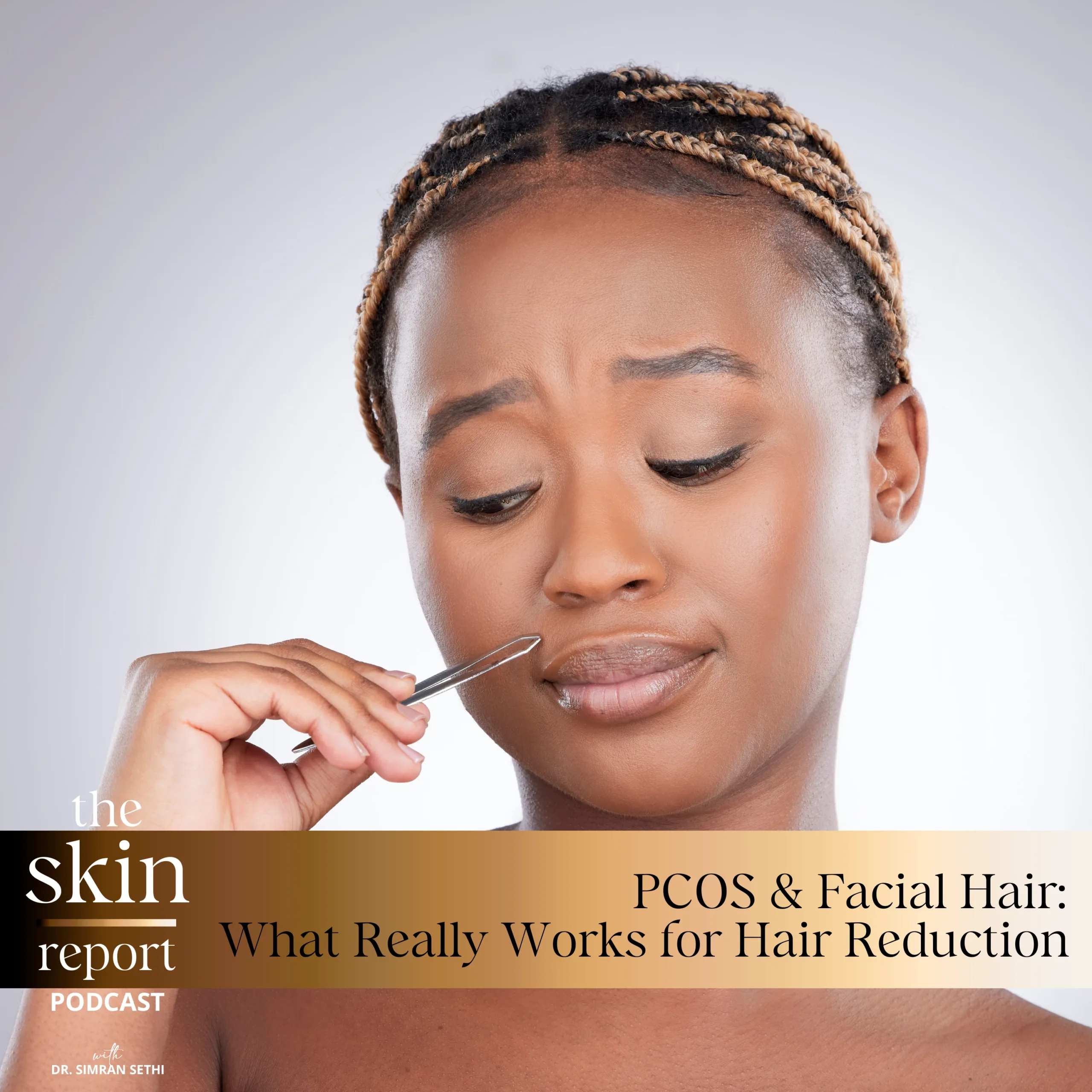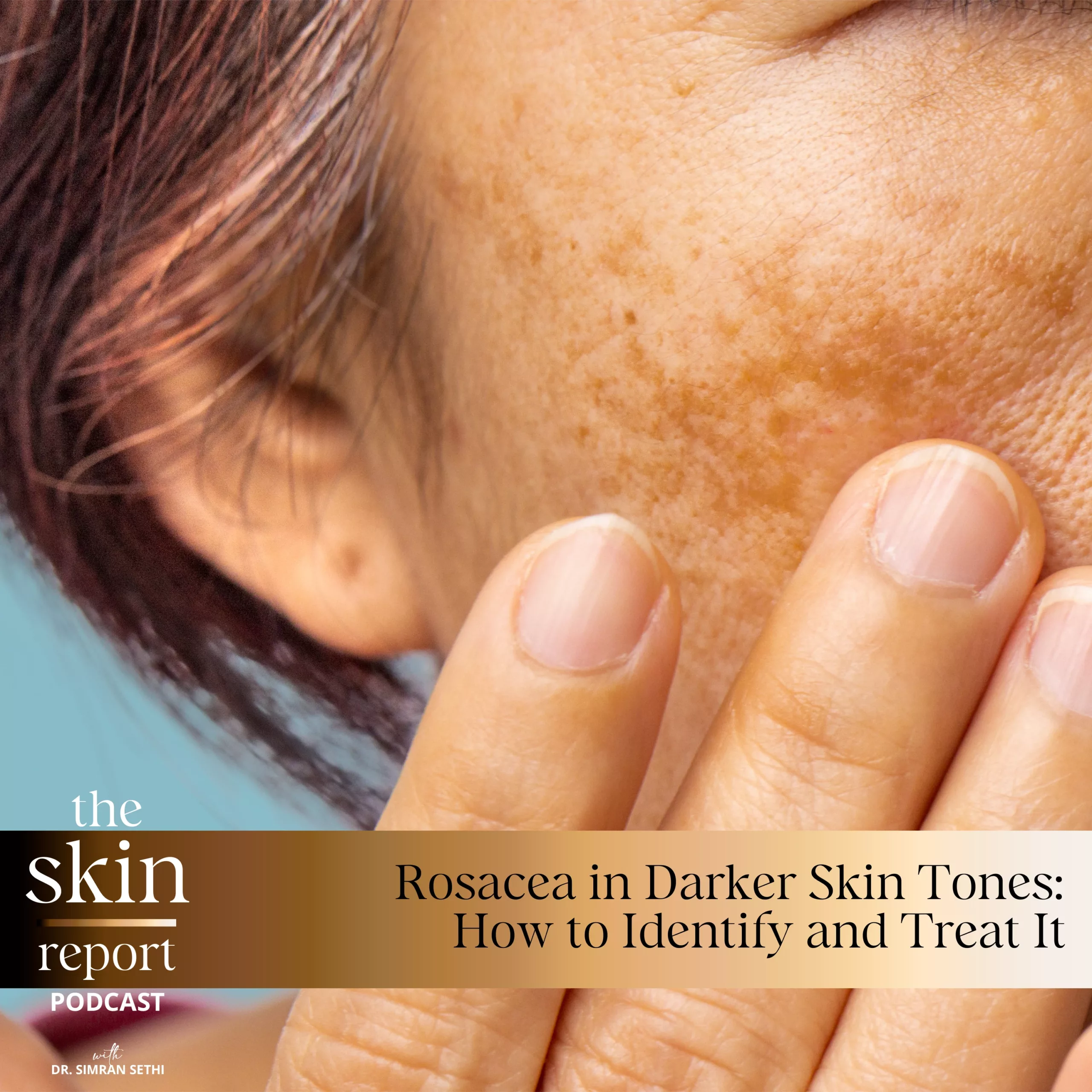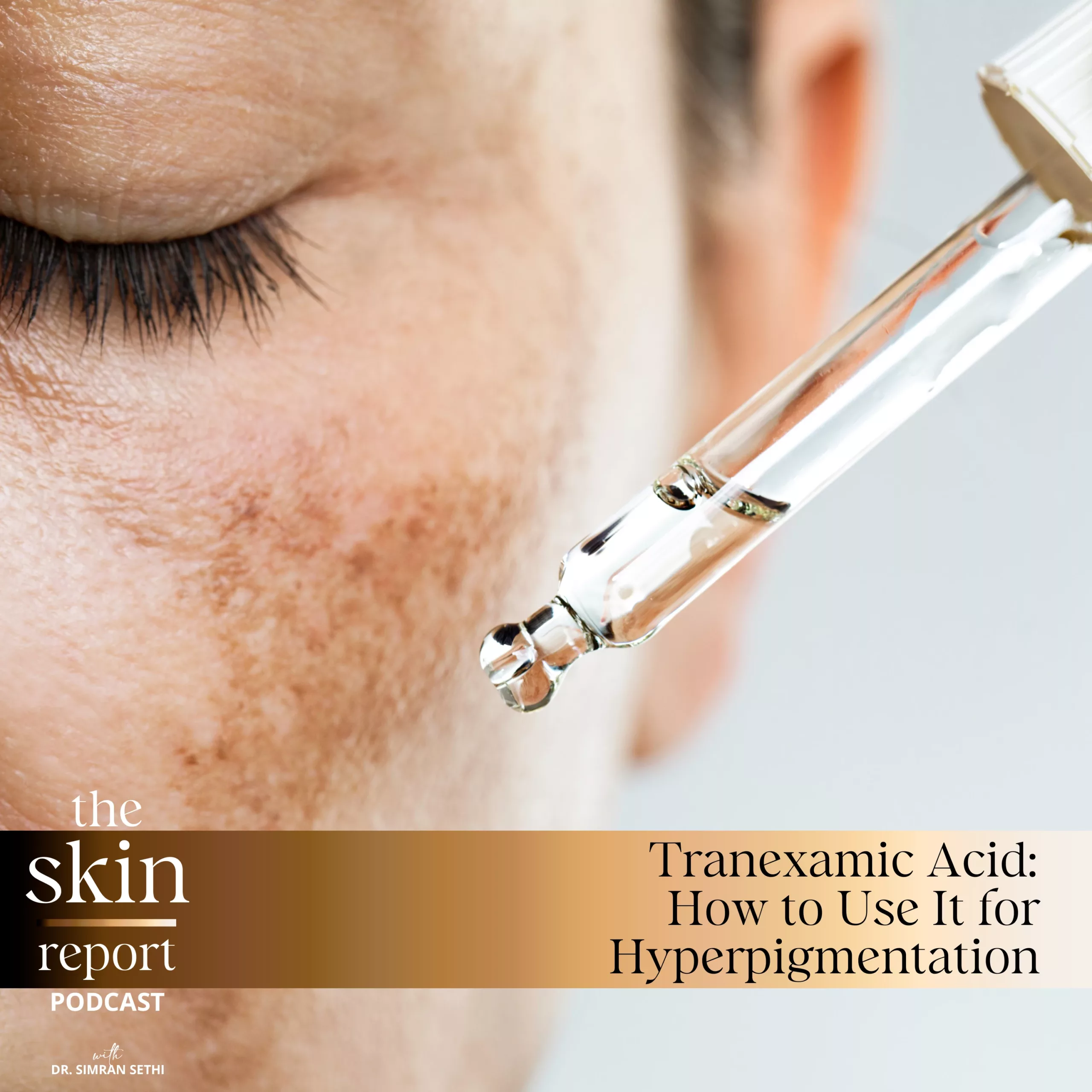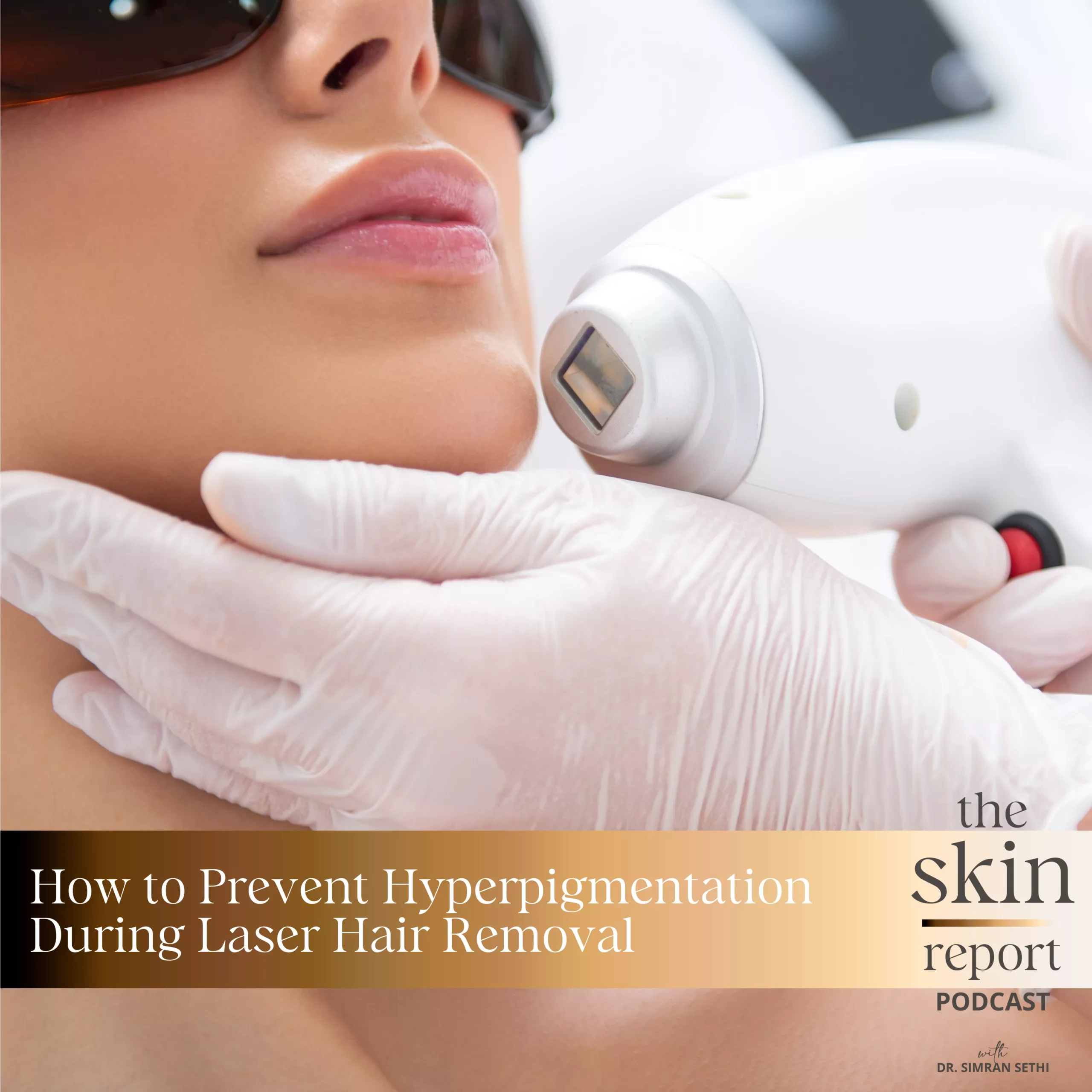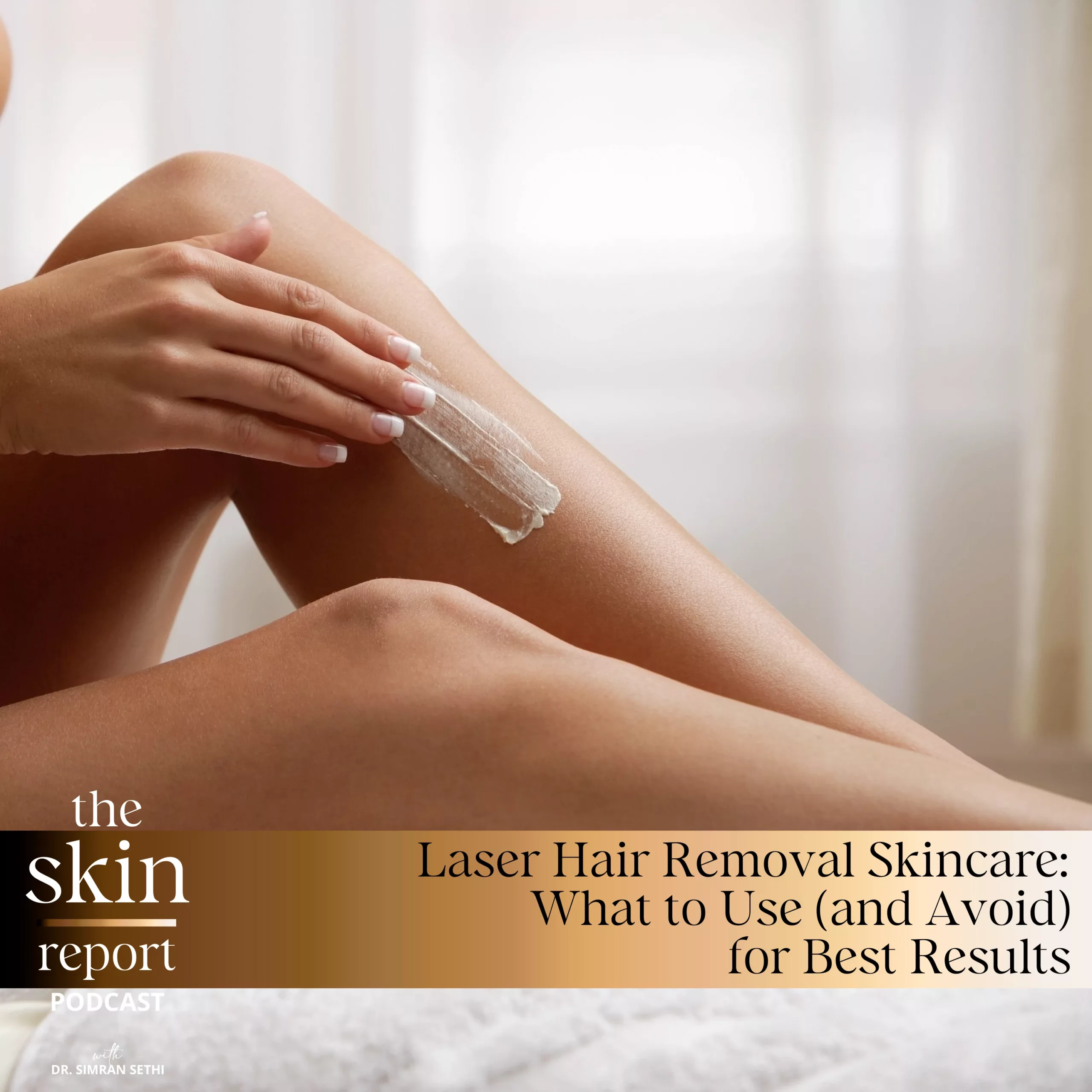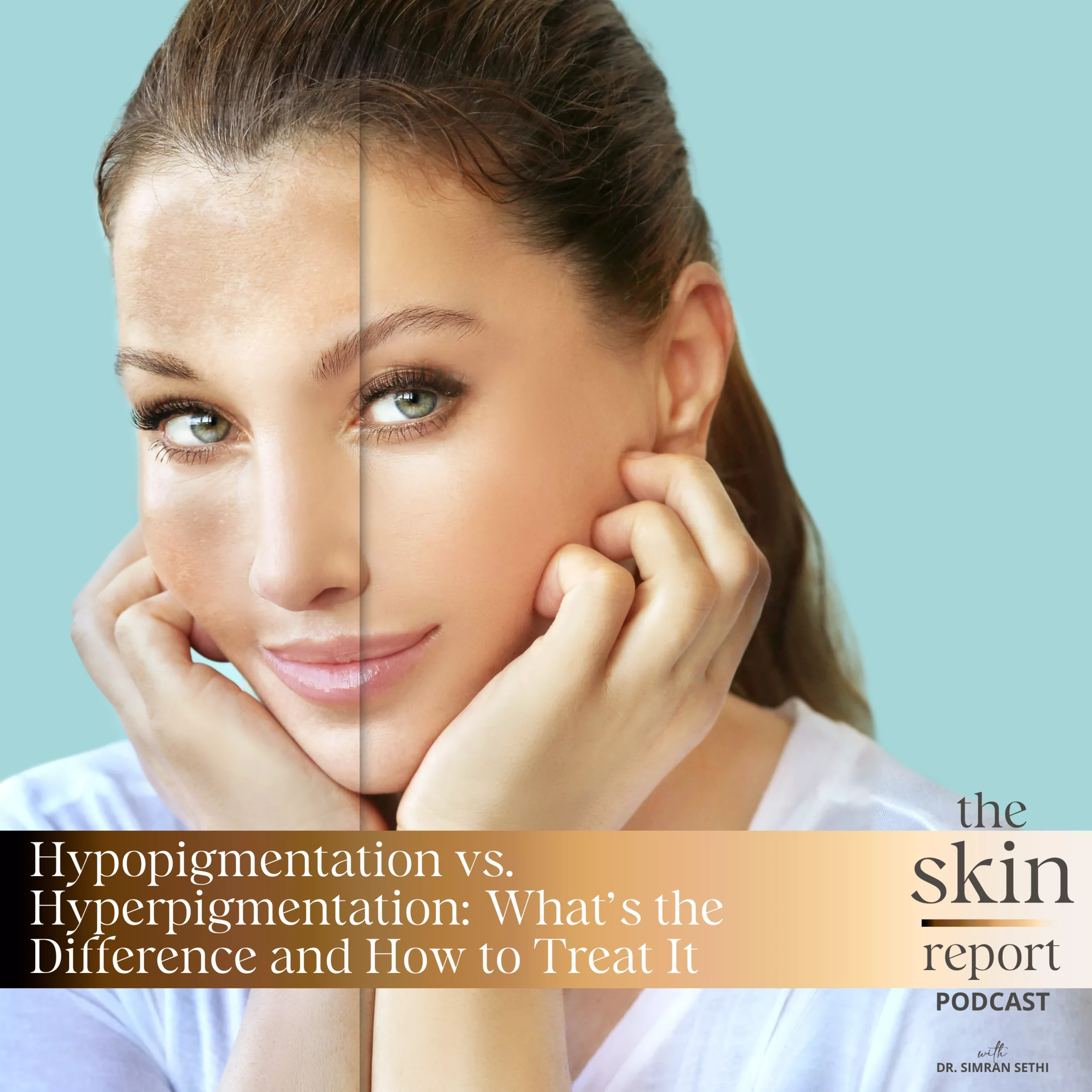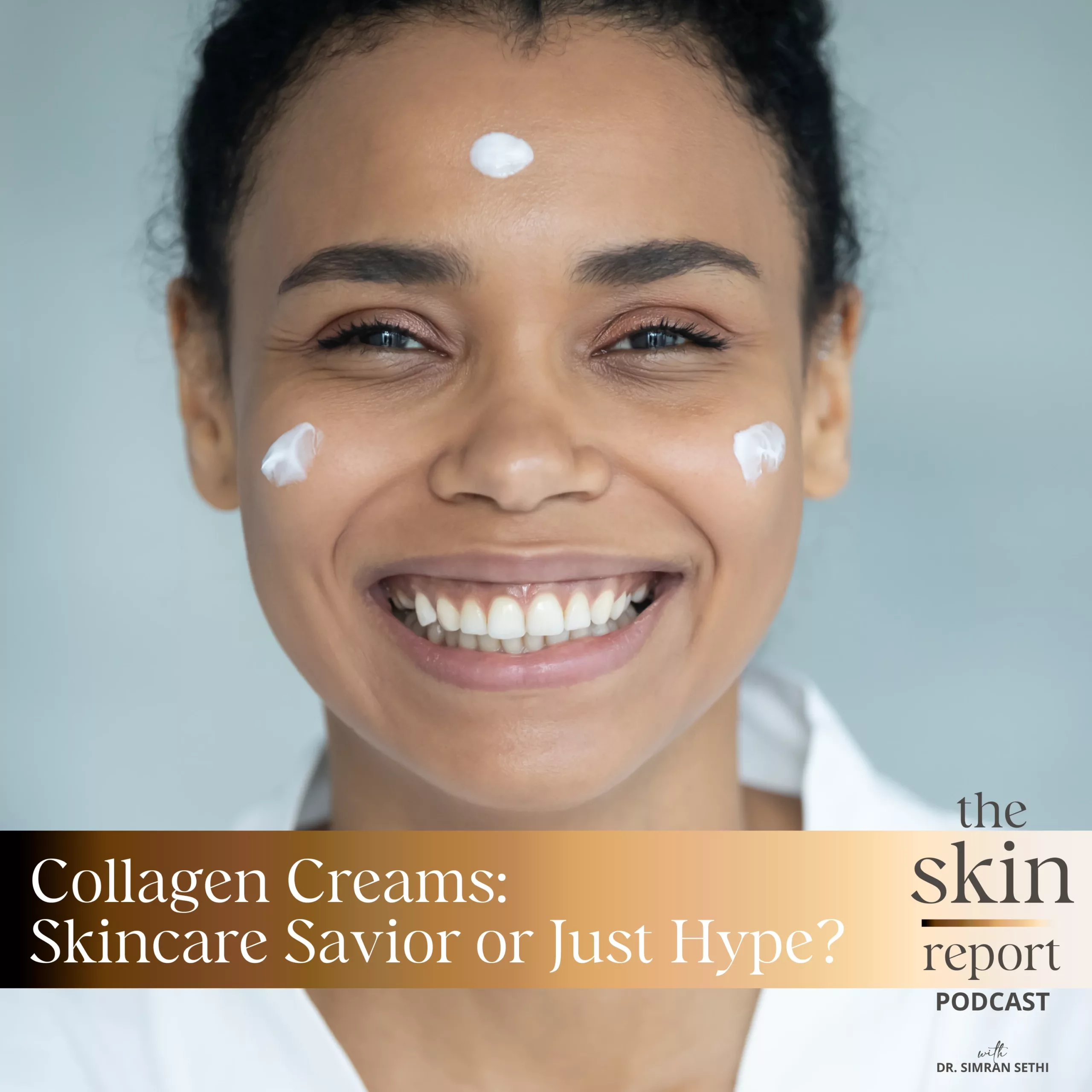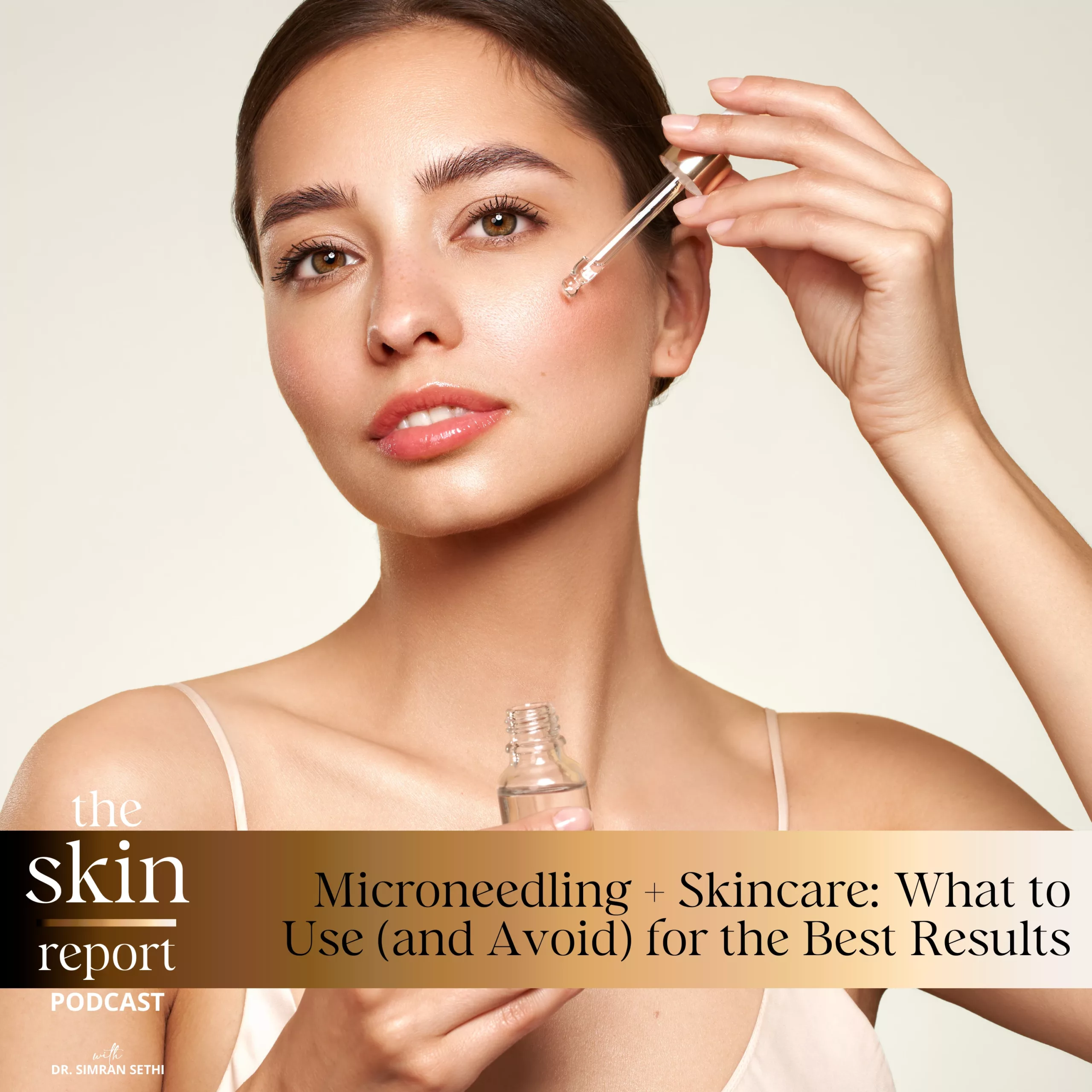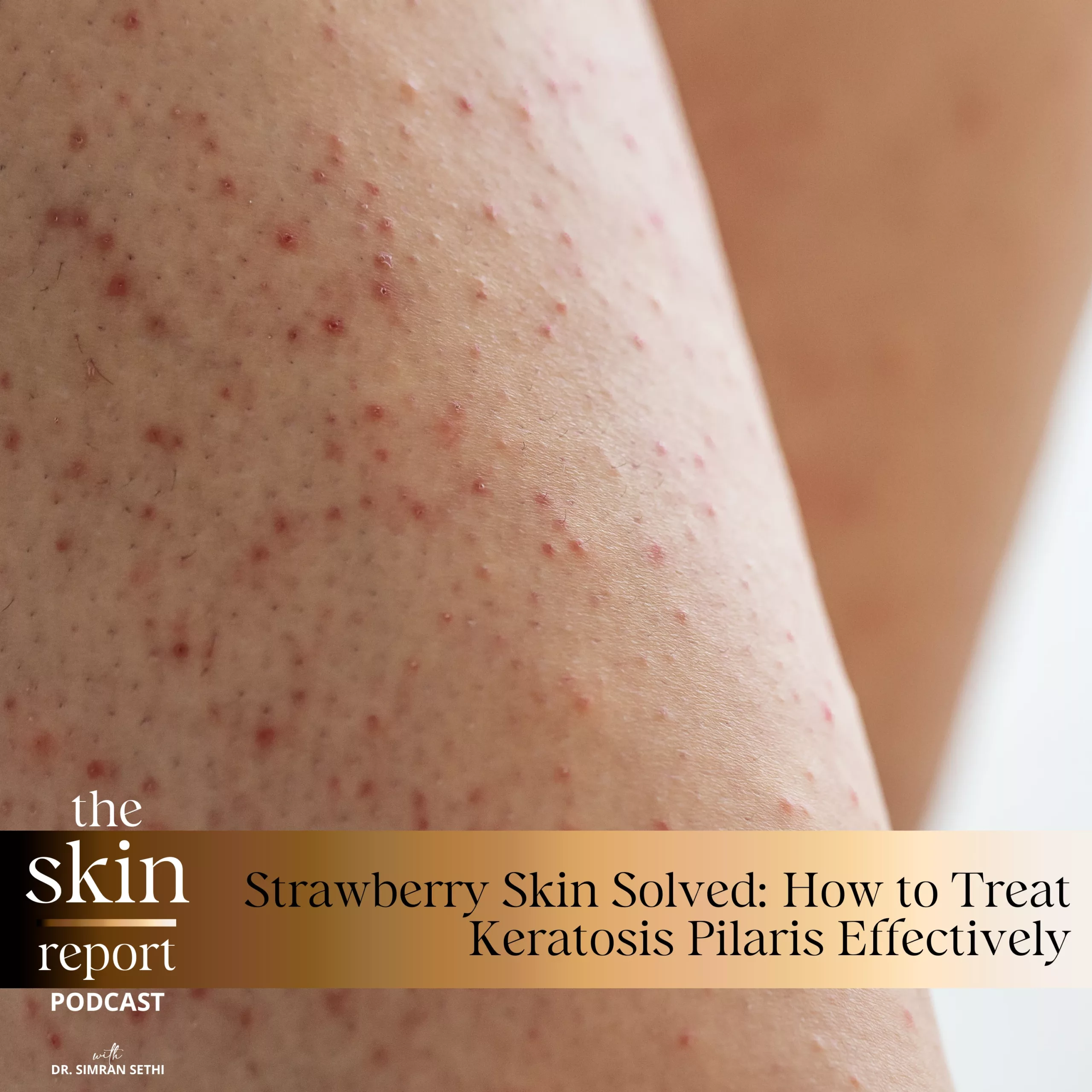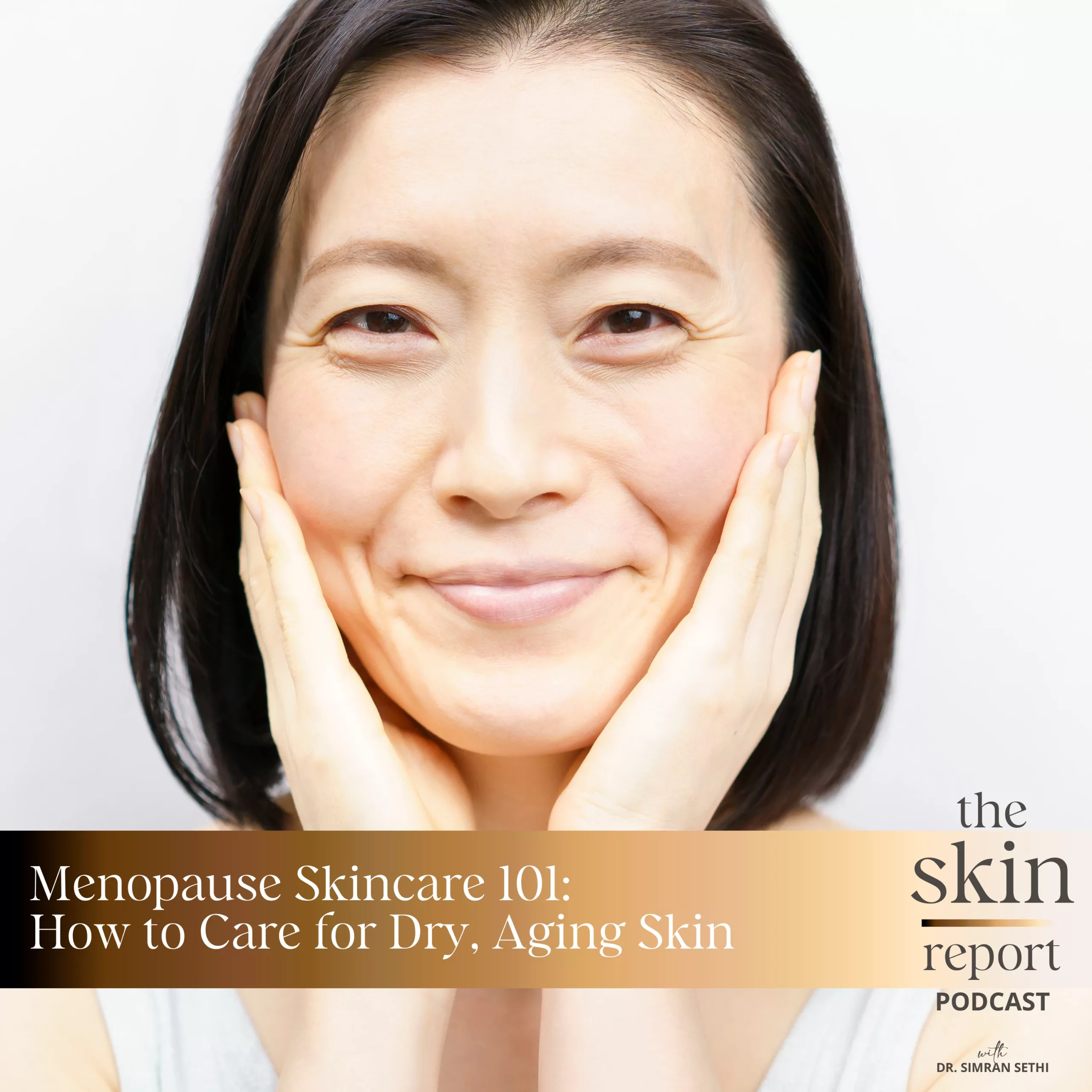The New Year can be an inspiring time to start new habits and pursue resolutions. And with many people returning from holidays and vacations, adopting new diets and weight loss plans are especially popular. But highly restrictive calorie diets can be detrimental to our skin, which requires certain nutrients. Without them, people can experience fatigue, cortisol increase, slower metabolism, and dryer, duller skin. So what weight loss diets should people follow to lose weight and support their skin health?
The Skin Report is a podcast created to educate listeners on methods to improve skin health for people of all ethnicities and ages. On this episode, host Dr. Sethi kicks off the new year by discussing popular weight loss diets and how they impact our skin. She approaches weight loss from a scientific perspective and explains the benefits and drawbacks of different weight loss diets like veganism, keto, and the paleolithic diet. Healthy weight loss can only be sustained if a healthy lifestyle is sustained, so this episode teaches users how to practice diets that support a healthy lifestyle and skin!
Follow and DM a question for Dr. Sethi to answer on The Skin Report Podcast:
Renew Beauty Instagram:
https://www.instagram.com/renewmd_beauty/
RenewMD Beauty Medical Spas, California:
https://renewmdwellness.com/
The Skin Report – PRP for Hair Restoration:
https://theskinreportbydrsethi.com/season-1-episode-30-prp-for-hair-restoration/
The Skin Report – Nutrition and the Skin:
https://theskinreportbydrsethi.com/season-1-episode-27-nutrition-and-the-skin/
Vegan Society History:
https://www.vegansociety.com/about-us/history
Ipsos Global Research:
https://retailnext.net/
PubMed Central
“Cutaneous lesions and vitamin B12 deficiency”:
https://www.ncbi.nlm.nih.gov/pmc/articles/PMC2294086/#:~:text=Cutaneous%20manifestations%20associated%20with%20vitamin,to%20vitamin%20B12%20deficiency%20alone
PubMed Central
“History of the ketogenic diet”:
https://pubmed.ncbi.nlm.nih.gov/19049574/
PubMed Central
“The promising potential role of ketones in inflammatory dermatologic disease: a new frontier in treatment research”:
https://pubmed.ncbi.nlm.nih.gov/28043175/
PubMed Central
“Effects of Diet on Acne and Its Response to Treatment”:
https://www.ncbi.nlm.nih.gov/pmc/articles/PMC7847434/
The Paleo Diet:
https://thepaleodiet.com/
NCBI
“Paleolithic Diet”:
https://www.ncbi.nlm.nih.gov/books/NBK482457/#:~:text=The%20concept%20of%20the%20Paleolithic,by%20Loren%20Cordain%20in%202002
This transcript was exported on January 3, 2023 -view latest version here.
Skincare can sometimes feel overwhelming. Whether it’s finding the right products, ingredients, or treatments, there’s a lot out there. But not always for people of African, Hispanic, Middle Eastern and East and South Asian descent. That’s why I set out to educate myself and others so that we can all feel beautiful in our skin. Hello and welcome to the Skin Report. I’m Dr. Simran Sethi, an internal medicine doctor, mom of three and CEO and founder of RenewMD Medical Spas and Skin by Dr. Sethi. Happy 2023.Yes, that’s right. This is our very first episode in the new year and with it, we’ve got some great skincare trends and topics to cover. You’ve already seen the title. To kick off 2023, we’re tackling popular weight loss diets and how they impact our skin. So whether you’re jumping into a healthier January or just curious about what lifestyles like veganism do for your skin, stick around to find out.
With the start of a new year and the return from holidays and vacation, many people want to reset their diet. In part, that’s why January becomes full of detoxes and diets or simply those trying to exercise more. There are so many articles, trends, commercials, and gimmicks that play into this desire to be healthier and with so many options, doing any of these can be overwhelming. That’s why I’m here to chat about weight loss from a scientific perspective.
The very first step in doing that is taking on the idea of a crash course diet, detox, or simply dramatic change to eating habits. Weight loss can only be sustained if a healthy lifestyle is sustained. Finding a healthy way to eat that also suits your taste and lifestyle is ultimately what promises success. I want to first talk about an eating approach that will always lead to failure and have the most negative impact on your skin, hair and nails, no matter what supplements, skincare products and treatments you consider. It can also impact mental health triggering disordered eating that can take a huge toll on your life. What is this approach? A highly restrictive calorie diet usually consuming less than a thousand or 1200 calories a day for women and men respectively. While people can do this for a few days or weeks, this level of restriction leads to considerable fatigue and most importantly, an increase in cortisol, our stress hormone.
In response to stress, our bodies will naturally secrete cortisol to redirect energy to our cardiovascular system and muscles to get the body ready for a fight or flight response, which allows the body to either quickly run away from or fight the stress. This is a primordial and instinctive physiological function that everyone possesses, initially created out of the environments that cavemen faced. So during this response, when cortisol levels are high, the body starts storing energy and every calorie you eat so that it is readily available to run away from a threatening lion or hunt your next meal. While our energy is directed towards survival functions, it is also being directed away from other functions including growth. Our naturally occurring growth hormone levels are suppressed, and therefore the skin rejuvenation, bone, hair, and nail growth that happens each night stops. You may recall from our two-part hair series that stress can lead to hair loss.
This is due to those having high cortisol levels. I’ve linked those episodes in the description below. In a modern world, we’re typically not running from lions or going days on end before being able to hunt. How does this relate to today and to restrictive diets? The truth of the matter is that our stresses may be different, but our bodies still experience stress. When we severely restrict calories, the body’s tricked into believing that we are stressed, perhaps hunting for our next meal and starts to store everything we eat. Our metabolism slows down and our energy is directed away from growing healthy skin, hair, and nails. This is why even if you lose some pounds initially on severe calorie restriction, your weight will actually plateau and not change after a week or two because your cortisol levels have probably increased. You’ll also notice that your skin becomes dry and dull and sometimes more prone to breakouts.
Hair and nail will also become brittle, and overall you will be more fatigued. The flight or fight response is not something that the body is designed to live in for long term and will adapt to the calorie restriction by producing even more cortisol, which will hold on to even more calories ingested and even more unwanted effects on the skin. I considered the skin our fifth vital sign of our health. When deprived, the body allocates energy to organs like the heart and brain with our skin being one of the last. This means that the skin is the first sign of how healthy or unhealthy your body is, and when you drastically cut calories, your skin is also the first to look dull and unhealthy. I bring all of this up because so many diets and trends support severe calorie restriction. If we drastically reduce our calorie intake, our bodies will fight it.
The only way to lead a healthy lifestyle that supports a healthy mindset, body and skin is to adopt a sustainable way of eating that is balanced. When we return, we’ll discuss eating lifestyles that don’t center on calorie restriction and are more sustainable in the long run. As weight loss can only occur with a healthier lifestyle, I chose diets that are less detoxes and more focused on altering our approach to eating. I will talk about what I like about these different diets, what they do for the skin, and what to be cautious of when pursuing them in your own lives. The first diet we’ll be discussing is veganism. While veganism is sometimes framed as the more extreme, more modern branch of vegetarianism, it has actually been recorded as early as 500 BC. Other records come from the 1800s until the term was officially coined in 1944.
Now, millions of Americans are vegan and each year that number grows according to global research company Ipsos. Vegan food examples include fruits, vegetables, nuts and seeds, whole grains, legumes, breads, rice, pasta, alternative milks like almond, soy, and oat. So let’s talk about what I like in the vegan diet. There’s of course an emphasis on plant-based foods, and as we know from our previous episode on nutrition and skin, incorporating fresh fruits and vegetables has an excellent impact on nourishing the skin renewal cycle and building collagen. You’re also consuming foods that have antioxidants, natural sugars, and are high in fiber. Fiber is a way to negate carbohydrate and mostly sugar uptake, which is great for your skin and overall health. Remember from the nutrition episode that excessive sugar intake will promote production of AGEs, advanced glycation end products that will stick onto your collagen and elastin proteins, making it difficult for these proteins to cross-link and essentially build your skin’s integrity, making skin thinner and more loose.
There are a few aspects of the vegan diet I’d like to caution against. Sometimes people begin or adopt this diet in a way that is still highly dependent on processed foods such as plant burgers or sausages. Eating such foods every once in a while is not harmful, but relying on them consistently negates all the beneficial aspects of being a vegan. Processed foods typically contain high quantities of sugar, salt, and even nitrates in many cases. Vegans or vegetarians who don’t eat eggs are also prone to a vitamin B12 deficiency, as B12 is only found naturally in animal products. Low vitamin B12 levels initially lead to anemia, but if the deficiency is prolonged, it can lead to hyperpigmentation of the skin and hair loss. I’ve actually seen a woman come to my clinic with what she was told was melasma, but after a careful history, it became clear that she actually had severe vitamin B12 deficiency.
If you’re vegan, add a B complex vitamin to your diet and some fortified cereals that will add vitamin B12 to your diet. If you’re a vegetarian eating eggs, specifically the egg yolk, will be another source of vitamin B12. One egg gives you approximately 25% of your daily B12 needs. Another thing to keep in mind is calcium. Vegans are usually low in absorb calcium, which is essential for bones. Calcium tends to be higher in dairy products, but vegans can get enough of it if they eat calcium fortified, plant-based milks, dark leafy vegetables, tofu and edamame. Low calcium leads to reduction of natural sebum production or natural skin oils, leaving skin, nails and hair dry and dull.
Over the past few years, keto has gain popularity for weight loss with its low carb, high fat diet. However, it was formulated for a different reason entirely. In the 1920s, the ketogenic diet was invented as a therapy for treating epilepsy until anti-epileptic drugs were introduced. When you cut back on carbs significantly, your body burns fat for fuel. Many people think that this is an easy way to lose weight without focusing on calorie restrictions. This is definitely not true. I have nothing against a ketogenic diet, but do feel that to be successful on it, you must properly understand how it works.
Carbohydrates are stored in the form of glycogen so that they can be rapidly available when you exercise. However, if you do not exercise or burn that source of fuel, the body will turn this into fat. When on a keto diet, you drastically reduce your carbohydrate intake, so approximately 50 grams a day, which is not enough carbs to store. So instead, your body will start breaking down fat stores to fuel activity and you will start losing weight. Let’s look at the other aspect of the keto diet. Low carb, high fat, there’s nothing wrong with eating fat. In fact, our bodies need fat. Fat is a dense source of calories. However, it’s important to know that you don’t need a ton of fat for your daily caloric expenditure. People generally feel full on a keto diet and eating too many calories is not an issue, but if you consume more than you need, even if they’re from fat, you will gain weight, not lose it with a keto diet.
Secondly, your carbohydrate intake must be extremely low on a ketogenic diet, which requires you to read food labels constantly and to understand them. So how does the keto diet impact our skin? In general, your fiber intake plummets when eating high fat foods and not enough vegetables. Fiber is crucial to improving the gut microbiome. It helps with our ability to absorb micronutrients like minerals and vitamin C, which are essential for skin health. Without these nutrients in our diet, our skin will become weaker and more prone to wrinkles. The good news is that the ketogenic diet encourages leafy vegetables that are high in antioxidants and fiber without the added carbs. So if you are switching to a keto diet and have cut out your carbs, be sure to add in plenty of greens. Before we move into our next diet, I want to touch on one last point to the keto diet, inflammation.
The ketogenic diet has actually been shown to reduce inflammation and is being extensively studied as a way of eating for people with inflammatory conditions like eczema and acne. It may seem counterintuitive to eat more fats with inflammatory conditions as they’re accompanied by excess oil on the skin, but ketones have been shown to reduce inflammation, which is the primary driver of acne lesions. When approaching the ketogenic diet, it’s important to understand its mechanisms so that it can be done in the most beneficial way. If done properly, it can be a healthy way to lose weight and keep skin healthy, and perhaps should be considered by those with moderate to severe acne or eczema. Next up on our popular weight loss diets is the paleo diet, otherwise known as the caveman diet where you eat food sought to have been consumed by humans living in the paleolithic era.
The paleo diet consists of consuming meats, eggs, fruits and vegetables, fish, nuts, et cetera, while avoiding processed foods, carbs, grains, and added sugars. First formulated in the 1970, the paleo diet gain popularity with the publication of the Paleo Diet book in 2002. Similar to the ketogenic diet, paleo is beneficial in inflammatory skin conditions, especially acne. It also does run the risk of being too low in fiber just like keto, but again, consuming vegetables and fruit will keep fiber levels adequate for optimal nutrient and antioxidant absorption. The last diet I’ll cover is one you’ve heard from me before in episode 31 on hair loss and restoration as a positive and beneficial lifestyle for balanced eating and weight loss. That’s right. I want to talk about the Mediterranean diet, which has been studied for decades and consistently ranks as the healthiest by standard, such as its effects on cholesterol levels, blood pressure, and overall longevity. It focuses on consumption of good fat, mostly omega-3s, whole grains, fruits and vegetables, and some fish, while reducing red meat intake and processed foods.
When it comes to skin health, this diet has an excellent balance of anti-inflammatory fat like keto and paleo diets do, which are beneficial if you suffer from acne, psoriasis, eczema, or other inflammatory skin conditions. The diet is also naturally balanced, which means it makes it easier to include essential vitamins like B12 that vegans cannot naturally get in their diet. The Mediterranean diet also includes fiber which those eating keto or paleo, may lack if not eating enough vegetables. Today we discussed the benefits versus drawbacks of different diets and how to mitigate them. In the end, the best way of eating that will result in a healthy rate of weight loss and keep your skin glowing is the one that you can properly do and stick to consistently. The healthier and happier you feel, the healthier and happier your skin will be as well. My personal favorite is a Mediterranean diet because it’s the least restrictive while also being the most balanced in nutrients, which are eventually going to reduce inflammation in our skin and cardiovascular system to improve longevity and keep skin strong and healthy.
If you’d like to learn more about science backed skincare or medical aesthetic treatments, please subscribe to and turn on notifications for the Skin Report so you always know when a new episode is up. We have a newsletter that you can sign up for on theskinreportbydrseti.com so that you can stay up to date on all our new episodes, blogs, products, and more. Additionally, if you have a skincare question or want to make an episode topic recommendation, please message me at theskinreportbydrsethi.com. We’ve received some great questions so far and I’ll try and answer them at the end of every episode, so keep them coming. Thanks for listening, and until next time, love the skin you’re in and celebrate your beauty.
Transcript by Rev.com


